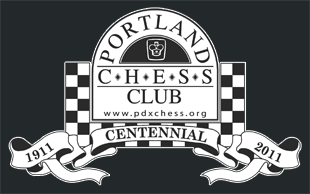Q: How do I get to the club and where should I park?
A: For driving directions to the club, parking information, and important information on how to get to the club facility in the morning before the mall is open, click here..
Q: Does the club provide coaching or instruction?
A: The club itself generally doesn’t provide coaching but occasionally we have special events that do. The club has a small library of chess books, many of which have good instructional material, that members can check out. The following club members do provide coaching (contact us if you are a club member and want to be added to this list; note that the club itself does not endorse any particular person):
Nick Raptis – FIDE Master, 6-time Oregon State Champion, 2017 Washington State Champion, coach for 20+ years. Coaches all levels based on old Russian training methods. Looking for students who are very passionate about the game and willing to improve through hard work combined with excellent guidance and coaching. njraptis@yahoo.com.
Q: Am I ready to play in a Portland Chess Club tournament?
A: We recommend that players be somewhat above the beginning level and know how to notate before playing in a PCC tournament. In addition, we recommend that scholastic players be comfortable playing in a serious tournament and against adults before playing in a PCC tournament. Tournaments that include sections for lower level players are usually the best to start with.
Q: Which chess clock should a tournament player buy?
A: Most tournaments these days (including all current PCC events) are played with one or two time periods and have an increment or delay of up to thirty seconds so you should get a clock that supports these features. For time controls with delay, it’s important for the clock to show the delay countdown in digits so you can always tell exactly how much time you have for a move if you are low on time. Digital clock expert Micah Smith recommends the upgraded version of the DGT North American clock (make sure it’s the upgraded version that was released in 2024).
Q: How do US Chess ratings and titles work?
A: See here and here (the one US Chess title not discussed in the link is the National Master title which is earned when a player achieves an established US Chess over-the-board regular rating of at least 2200).
Q: What’s the difference between official and unofficial US Chess ratings?
A: US Chess currently publishes “official” ratings once a month. A players rating on the third Wednesday in the month, if it’s based on at least four lifetime games, will be their official (or published) rating for events starting the following month. A rating based on less than four lifetime games remains unofficial. Using the official ratings allows one to know farther in advance what sections and prizes they will be eligible for at an upcoming tournament. However, using the latest “unofficial” (or “live”) ratings (which must be announced in advance) can put players in more appropriate sections, have them be eligible for more appropriate prizes, and lead to better pairings. Currently, the PCC generally uses the official ratings for all its tournaments.
Q: How do the pairings at tournaments work?
A: The two most common methods of pairing chess tournaments are the Swiss and round robin. All PCC tournaments are currently paired in Swiss, double Swiss, or round robin format. There are different methods to the Swiss system that sometimes produce slightly different pairings (for example, US Chess and FIDE Swiss pairing rules). In a round robin, everyone in a section plays each other. A four player round robin is known as a quad. In a round robin, players are seeded randomly (“by lot”) with the exception that under US Chess rules, it’s preferred to seed quads by rating. Under US Chess rules the order of pairings and colors in each matchup are determined by the Crenshaw tables and under FIDE rules they are determined by the Berger tables. In a double Swiss or double round robin, you play each opponent twice, once as White and once as Black. In double round robin blitz tournaments, the rematches are almost always played immediately. In double round robin regular rated tournaments, you usually play everyone once before playing the rematches.
Q: Why is Oregon Chess Federation (OCF) membership required for Oregon residents to play in most of the two day annual PCC tournaments?
A: To support the Northwest Chess organization financially (most of the OCF membership dues goes to supporting the Northwest Chess magazine), support the OCF financially, and so the tournaments are qualifiers for the Challengers section of the Oregon Closed.
Q: How can I check to see if I am a current member of the OCF?
A: Currently, the best way is to inquire via email at info@nwchess.com.
Q: When does the next round start?
A: At most PCC tournaments the starting time of the next round is shown on the clock above the pairings and/or on the pairings sheet.
